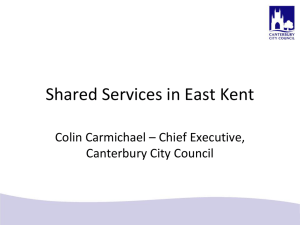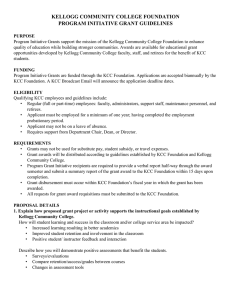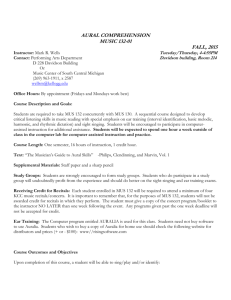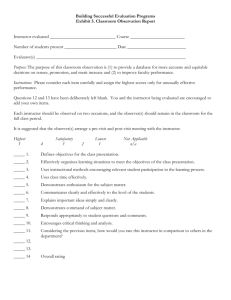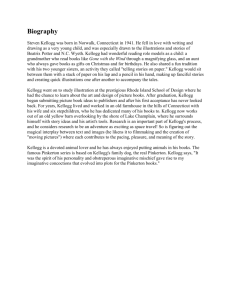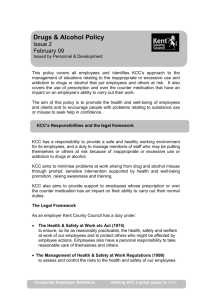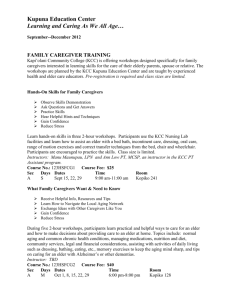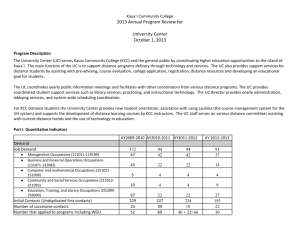Music Theory 1 - Kellogg Community College
advertisement
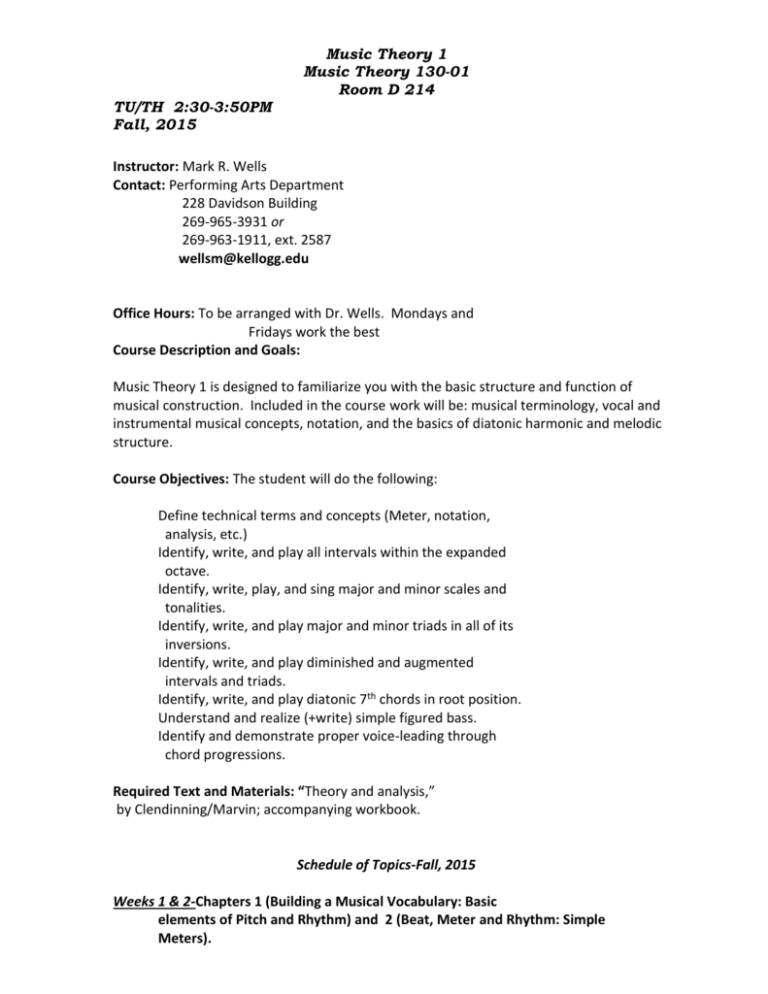
Music Theory 1 Music Theory 130-01 Room D 214 TU/TH 2:30-3:50PM Fall, 2015 Instructor: Mark R. Wells Contact: Performing Arts Department 228 Davidson Building 269-965-3931 or 269-963-1911, ext. 2587 wellsm@kellogg.edu Office Hours: To be arranged with Dr. Wells. Mondays and Fridays work the best Course Description and Goals: Music Theory 1 is designed to familiarize you with the basic structure and function of musical construction. Included in the course work will be: musical terminology, vocal and instrumental musical concepts, notation, and the basics of diatonic harmonic and melodic structure. Course Objectives: The student will do the following: Define technical terms and concepts (Meter, notation, analysis, etc.) Identify, write, and play all intervals within the expanded octave. Identify, write, play, and sing major and minor scales and tonalities. Identify, write, and play major and minor triads in all of its inversions. Identify, write, and play diminished and augmented intervals and triads. Identify, write, and play diatonic 7th chords in root position. Understand and realize (+write) simple figured bass. Identify and demonstrate proper voice-leading through chord progressions. Required Text and Materials: “Theory and analysis,” by Clendinning/Marvin; accompanying workbook. Schedule of Topics-Fall, 2015 Weeks 1 & 2-Chapters 1 (Building a Musical Vocabulary: Basic elements of Pitch and Rhythm) and 2 (Beat, Meter and Rhythm: Simple Meters). Homework: Chapters 1 & 2. Weeks 3 & 4-Chapters 3 (Pitch Collections, Scales, and Major keys) and 4 (Minor Keys and the Diatonic Modes). Homework: Chapters 3 & 4. Weeks 5 & 6-Chapters 5 (Beat, Meter, & Rhythm) and 6 (Pitch Intervals) and 6 (Pitch Intervals). Homework: Chapters 5 & 6. Weeks 7 & 8-Chapters 7 (Triads and Seventh Chords) and 8 (Intervals in Action). Two-voice Compositions-Two-voice counterpoint and four-voice chorales). Homework: Chapters 7 & 8. Weeks 9 & 10- Chapters 9 (Melodic and Rhythmic Embellishment in Two-Voice Composition) and 10 (Notation and Scoring). Homework: Chapters 9& 10. Weeks 11 & 12-Chapters 11 (Voicing Chords in Multiple Parts) and 12 (The Basic Phrase Model). Homework: Chapters 11 & 12. Weeks 13 & 14-Chapters 13 (Embellishing Tones) and 14 (Chorale Harmonizations and Figured Bass). Homework: Chapters 13 & 14. Weeks 15 & 16-Review. Receiving Credit for recitals: Students will receive credit for attending a minimum of FOUR KCC music recital/concerts. It is important to remember that, for the purposes of Music 130 students will not be given credit for recitals in which they perform. The student must give a copy of the concert program to the instructor NO LATER than one week following the event. After the deadline, credit will not be given for the recital concert. Methods/Evaluation Lectures, class participation, attendance in class, participation, and written work. Grading System A AB+ B B- 94-100 90-93 87-89 84-86 80-83 C+ 77-79 C CD+ D D74-76 70-73 67-69 64-66 60-63 F 59 and POINT ASSESSMENT: Attendance Homework Concert/Recital Attendance 5% Quizzes Final 20% 25% 30% 20% It is understood that students will be attending the classes for which they have signed up (see policy below). KCC General Policy Statements 1). Kellogg Community College Academic Integrity Statement: The Kellogg Community College policy on Academic Integrity is spelled out in the student handbook. If it is suspected that you are cheating, fabricating, facilitating academic dishonesty, or plagiarizing, there may be serious consequences. The incident will be documented and may be reported to the academic chair and/or program director for possible disciplinary actions up to and including course, program, or college expulsion. 2). Kellogg Community College Americans with Disabilities Act and Section 504 Statement: Kellogg Community College does not discriminate in the admission or treatment of students on the basis of disability. KCC is committed to compliance with the Americans with Disabilities Act and Section 504 of the Rehabilitation Act. Students with a documented disability are strongly encouraged to speak with the instructor and with the professional staff at support services (ext. 2624). The college offers many resources, but it is important to take advantage of them early. It is the student’s responsibility to notify the College and instructors of your needs. 3). Instructor Syllabus Rights Statement: Information contained in this syllabus was to the best knowledge of the instructor considered correct and complete when distributed for use at the beginning of the semester. However, this syllabus should not be considered a contract with Kellogg Community College and any student, nor between the instructor and any student. The instructor reserves the right, acting within the policies and procedures of Kellogg Community College, to make changes in the course content or instructional techniques without notice or obligation. 4). Student e-mail: YOU MUST HAVE A FUNCTIONING KCC E-MAIL ADDRESS! All KCC students are provided with e-mail accounts through the college server. You will be responsible for checking your KCC e-mail regularly and should be prepared to use KCC e-mail as part of student-college interaction. For e-mail account information, check the web at www.kellogg.edu/email/geninfo 5). Cell Phone and Other Electronic Equipment Statement: CELL PHONES AND PAGERS must be on mute during class. If you must take or return an emergency call, please go out into the hall to do so. 6). Class conduct and Participation: Class participation is encouraged. We will follow the College policies regarding Conduct. I expect students to create an atmosphere of respect. Come prepared with an open attitude that is professional and shows that you are ready to learn. 7. Food Statement: Drinks and/or snacks may NOT be brought into the keyboard/computer lab. This rule is strictly enforced. 8). Attendance policy: Attendance is a graded component of this class. Missing five or more classes/labs will result in a non-passing grade. If you miss class, it is your responsibility to find out what you missed from other students or the instructor. The instructor is under no obligation to make up missed assignments or activities with you. In case of tardiness or early departure, 1 point is deducted for each ten minutes. 9). Homework policy: Assignments are due at the beginning of the class meeting for which they are assigned. Late work will NOT be accepted. The assignments will be graded and returned at the beginning of the following class meeting. 10). Withdrawal: Check with the registrar’s office for the last day to withdraw and receive full refund. It is the student’s responsibility to obtain this information. If you fail to withdraw from class before the deadline, you will be held accountable for your end of the semester grade. SUPPLIMENTAL MATERIALS: Music staff paper in a 3-ring binder. Pencils and a KCC or other working e-mail account. NB: THE SCHEDULE IS SUBJECT TO CHANGE. I WILL DO MY BEST TO REMAIN ON SCHEDULE AS BEST AS POSSIBLE. YOU ARE EXPECTED TO WORK ON ALL ASSIGNMENTS WEEKLY. PLEASE DO NOT ALLOW YOURSELF TO GET BEHIND IN YOUR ASSIGNMENTS-I WILL BE PERIODICALLY CHECKING TO MAKE SURE YOU ARE CURRENT IS THESE WORKBOOK ASSIGNMENTS. IT IS ALSO SUGGESTED THAT YOU READ THE ASSIGNED CHAPTER(S) PRIOR TO THE CLASS DISCUSSION. FINALLY, I ENCOURAGE YOU TO MAKE REGULAR APPOINTMENTS WITH ME TO DISCUSS YOUR PROGRESS. I WILL PROVIDE YOU WITH A MID-TERM GRADE/ASSIGNMENT ASSESSMENT.
